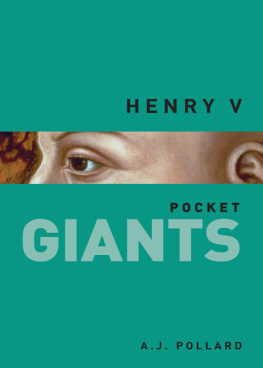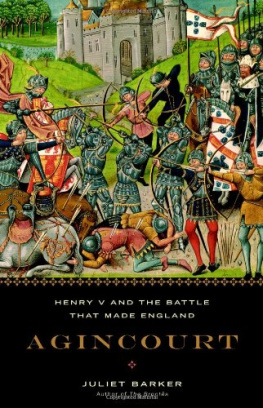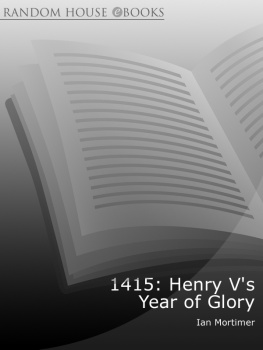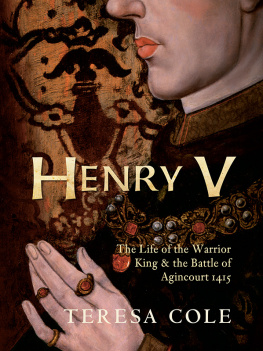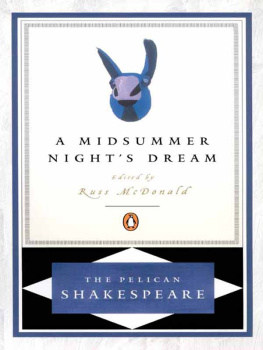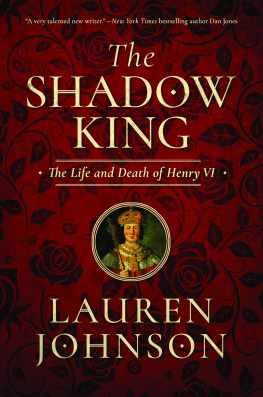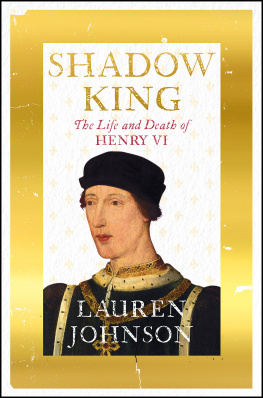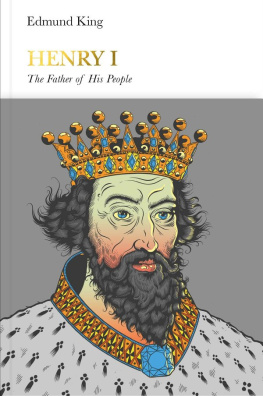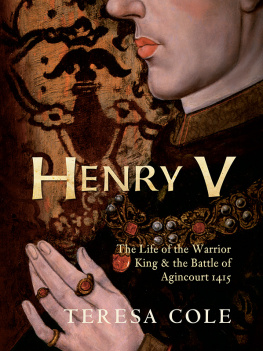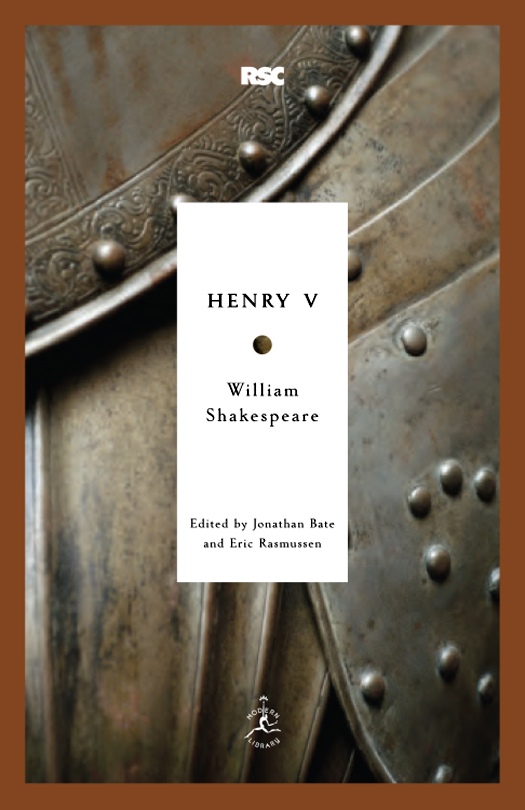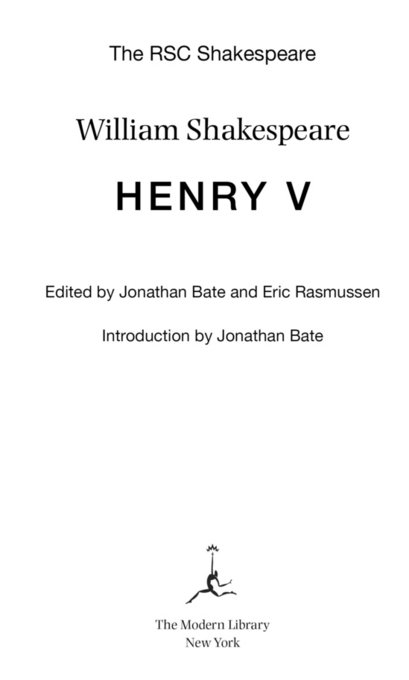The RSC Shakespeare Edited by Jonathan Bate and Eric Rasmussen
Chief Associate Editors: Hlose Snchal and Jan Sewell
Associate Editors: Trey Jansen, Eleanor Lowe, Lucy Munro, Dee Anna Phares
Henry V Textual editing: Eric Rasmussen
Introduction and Shakespeares Career in the Theater: Jonathan Bate
Commentary: Esme Miskimmin and Hlose Snchal
Scene-by-Scene Analysis: Esme Miskimmin
In Performance: Karin Brown (RSC stagings), Jan Sewell (overview)
The Directors Cut (interviews by Jonathan Bate and Kevin Wright): Kenneth Branagh, Ed Hall, Nicholas Hytner, Michael Boyd
Editorial Advisory Board Gregory Doran, Chief Associate Director,
Royal Shakespeare Company
Jim Davis, Professor of Theatre Studies, University of Warwick, UK
Charles Edelman, Senior Lecturer, Edith Cowan University,
Western Australia
Lukas Erne, Professor of Modern English Literature,
Universit de Genve, Switzerland
Akiko Kusunoki, Tokyo Womans Christian University, Japan
Jacqui OHanlon, Director of Education, Royal Shakespeare Company
Ron Rosenbaum, author and journalist, New York, USA
James Shapiro, Professor of English and Comparative Literature,
Columbia University, USA
Tiffany Stern, Professor of English, University of Oxford, UK
2010 Modern Library Paperback Edition Copyright 2007, 2010 by The Royal Shakespeare Company All rights reserved. Published in the United States by Modern Library, an imprint of
The Random House Publishing Group, a division of
Random House, Inc., New York. M ODERN L IBRARY and the T ORCHBEARER Design are registered trademarks of Random House, Inc. Royal Shakespeare Company, RSC, and the RSC logo are trademarks or registered trademarks of The Royal Shakespeare Company. The version of
Henry V and the corresponding footnotes that appear in this volume were originally published in
William Shakespeare:Complete Works, edited by Jonathan Bate and Eric Rasmussen, published in 2007 by Modern Library, an imprint of The Random House Publishing Group, a division of Random House, Inc. eISBN: 978-1-58836-846-1 www.modernlibrary.com v3.1
CONTENTS
INTRODUCTION
THE THEATER OF WAR
Henry V has become synonymous with English patriotism.
A dashing young king achieves a stunning military victory against all odds, stirring his men to impossible valor through sheer rhetorical force. The phrases have become legendary: Once more unto the breach, dear friends, once more; Cry God for Harry, England, and Saint George!; We few, we happy few, we band of brothers. Whereas all Shakespeares other history plays of the 1590s portray an England riven by faction and anxiety over rightful succession to the throne, here the nation seems united and all-conquering. Perhaps no other Shakespeare play has such a simple plot: King Harry makes his claim for France, sees off a small conspiracy, sets sail, takes Harfleur, wins the battle of Agincourt, and marries the defeated kings daughter. The cast consists almost entirely of his loyal army and his French enemies, among whom the dauphin in particular is a parodic reprise of the fiery Hotspur of Henry IV Part I. Henry IV Part II had ended with an epilogue promising a continuation of the story with Sir John Falstaff in it: the fat knights absence casts a shadow across the kings triumphs. (We do not know why Shakespeare failed to fulfill his promise: it might have been because he didnt want Falstaffs presence to overshadow the military glory, or it might have been because the comic actor for whom the part may have been written, Will Kempe, had suddenly left the company.) The play does not begin with a ceremonial entrance and a large-scale royal court scene. (We do not know why Shakespeare failed to fulfill his promise: it might have been because he didnt want Falstaffs presence to overshadow the military glory, or it might have been because the comic actor for whom the part may have been written, Will Kempe, had suddenly left the company.) The play does not begin with a ceremonial entrance and a large-scale royal court scene.
First the Chorus appears alone on the bare stage. The audience are invited to reflect upon the fact that what they are about to witness is performance, not reality, and that their imaginary forces will be necessary in order to transform stage and playing company into battlefield and army. The play is intended to work upon us as King Harry works upon his followers: the dazzling power of words creates the triumph out of extremely limited resources. Between each act the Chorus returns to remind us that it is all a theatrical trick: we only suppose that we have been transported to France and that the little band of players and extras constitute a great army on the march or fighting to the death in hand-to-hand combat. Players, as Macbeth and Prospero will remind later Shakespearean audiences, are but shadows. After two or three turns of the hourglass, the revels end and the action vanishes like a dream.
So too with Harrys triumph: the closing chorus, an artfully turned sonnet, compares the imaginative work of the author (In little room confining mighty men) with the brevity of the victorious kings reign (Small time, but in that small most greatly lived/This star of England). Could it then be that the secret of Harrys success is linguistic might rather than the right of his cause? The action proper commences with the representatives of the church confirming the reformation of the king, his conversion to piety from the wildness of the Henry IV plays, in which he had been seen as a wayward youth in the company of lowlife characters in Londons East End. Now he has transformed himself into a master of divinity, political affairs, and the theory of war. The dialogue of the bishops also introduces another theme, familiar from the historical reformation of the sixteenth century: the sequestration of ecclesiastical assets by the state. This precipitates a political deal: the archbishop will provide legal justification for the kings proposed invasion of France and in return the crown will take the side of the church in their financial dispute with parliament. The whole apparatus of justification by precedent, descent, and debate over the applicability of the Salic law, elaborated in the archbishops interminable speech in the following scene, is a charade acted out for politic ends.
The king has a one-line questionMay I with right and conscience make this claim?and he gets the answer he wants to hear: yes. He is not interested in the small print. By starting the action with the scheming bishops, Shakespeare suggests that the motivation for war is more a matter of political pragmatism than high principle. King Harry is anxious about a possible Scottish incursion and he is aware that his own hold on the throne is insecurehence the need to reveal the iron fist in his velvet glove by dispatching the traitors Cambridge, Scroop, and Grey. Their unmasking is achieved by means of a piece of theater that shows Harrys capacity for both mercy and stern justice. (Henry IV Part II, Act 4 Scene 2) There is nothing like an overseas military adventure to unite a divided nation. (Henry IV Part II, Act 4 Scene 2) There is nothing like an overseas military adventure to unite a divided nation.
Prince Hals riotous behavior in the Henry IV plays is now revealed to have been an elaborate game, a piece of playacting. He continues to play games once he is king: his handling of the traitors in the second act and the business of the glove in the cap after Agincourt are theatrical devices designed to demonstrate his quasi-magical power of seeing into his subjects souls. The manner in which an actor plays the part of King Harry will be largely determined by the extent to which he plays up the characters actorliness. The wooing of Katherine is a crux in this regard: how much of a


